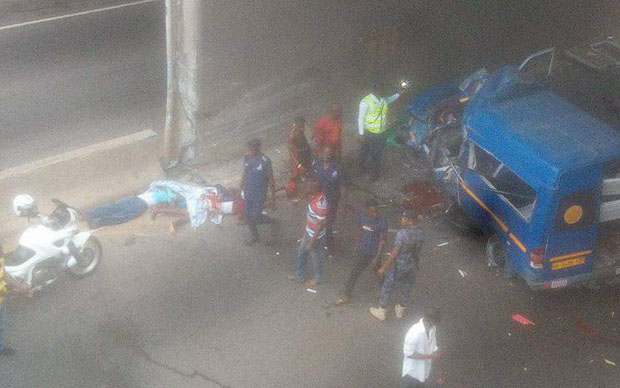Last week witnessed the devastating story of a commercial driver crashing his vehicle into an embankment on the Accra to Achimota dual-carriageway. Four persons lost their lives and others sustained injuries of various degrees as a result of the irresponsibility of the driver.
Preliminary conclusion from passengers onboard the bus was that, at the time of the accident, the driver was engaged in an argument on his mobile phone.
Not even the warnings of the passengers to stop talking on the phone stopped him.
We do not have to be experts to deduce from the foregone that the driver lost control of his vehicle because his attention was not riveted on the road and at the speed at which he was cruising, the accident was bound to occur.
We recall the efforts made by the law enforcement agents sometime ago to stop phoning and driving by motorists. Many argued at the time that there was no law backing the efforts of the police in that direction. Some cops abused the efforts by using it as a means of fleecing monies from drivers and therefore exposed themselves to public condemnation. Now no police officer stops motorists for driving and phoning or even texting: both of which are very dangerous.
Although it is not cast in our laws that the foregone are outlawed, any action that can endanger the lives of passengers and other road users by drivers is an illegality.
Be it as it may, new trends such as mobile devices which are novelties in society among others demand the enactment of appropriate laws to regulate their use.
The number of persons who have lost their lives as a result of divided attention on our roads is substantial. We cannot therefore ignore this suggestion.
In some countries in the other hemisphere, picking calls or talking on mobile devices while crossing roads are actionable offences. Here it is common to find people, phones clutched to their ears as they cross dangerous roads. It would be foolhardy for cops to arrest such persons and prosecute them because not only would the suspects be released; the law enforcement agents would lose face. Perhaps that is what accounts for the sudden indifference of cops to motorists driving and taking calls or even texting messages.
Another subject which is worth visiting by the authorities is the illegal commercialization of motorcycle taxis.
It is a means of livelihood for many in our urban areas but considering the illegality involved in the occupation and the life-threatening it brings upon both the riders and pillion riders and even fatalities associated with the occupation, we can only ask that the enforcement of the law be considered and where they do not exist, the appropriate action can be taken to enact them.
Seeing what befalls motorcyclists, the fatalities and the injuries – it would be irresponsible not to suggest a form of regulation or even the application of the appropriate laws.
In both the use of mobile phones while driving and the illegality of motorcycle taxis, lives are threatened hence our call for the necessary response from government.


